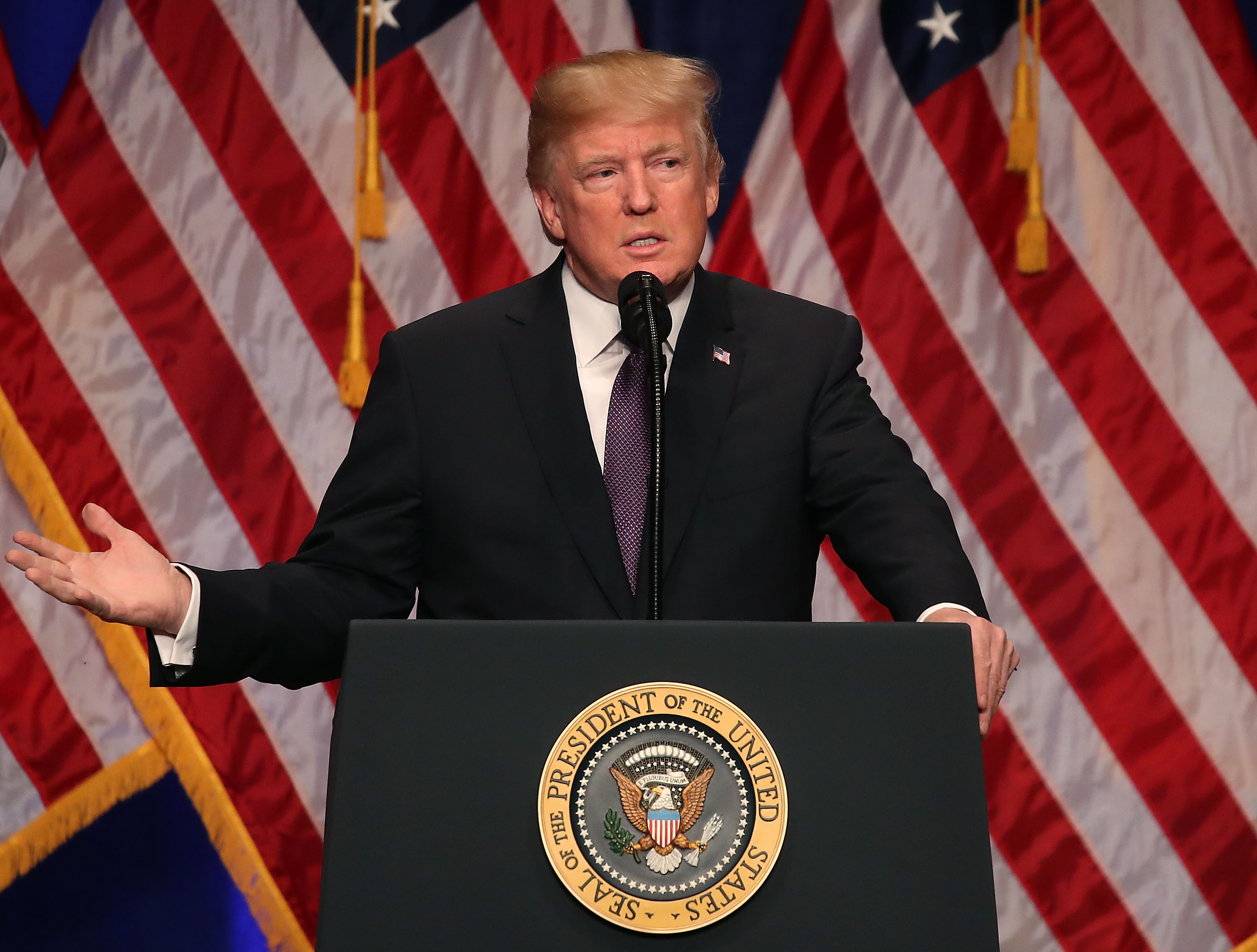Trump's new foreign policy strategy couldn't have been released at a worse time
I thought timing was everything?


A free daily email with the biggest news stories of the day – and the best features from TheWeek.com
You are now subscribed
Your newsletter sign-up was successful
It seems national security experts here in Washington have just been given the ultimate holiday reading gift: the Trump administration's National Security Strategy (NSS). Sprinkled with a mix of economic nationalism, realist rhetoric, and great power politics, this strategy document is sure to be championed by those who want a full-throated Trumpian foreign policy agenda. They'll call it a complete recasting of America's national security objectives and priorities after President Obama's "leading from behind" approach.
On the surface it doesn't sound half bad. Except it's a total scam.
For those of us who believe that smart foreign policy strategy is all about good timing and applied realism, not catchy slogans that mask difficult policy problems, disappointments abound in this so-called strategy.
The Week
Escape your echo chamber. Get the facts behind the news, plus analysis from multiple perspectives.

Sign up for The Week's Free Newsletters
From our morning news briefing to a weekly Good News Newsletter, get the best of The Week delivered directly to your inbox.
From our morning news briefing to a weekly Good News Newsletter, get the best of The Week delivered directly to your inbox.
To be clear, this NSS is all about one thing: trying to turn President Trump's complicated worldview (a mix of contradictory ideas and WWE-style attack lines) into a coherent strategy that can guide the country's foreign policy priorities for years to come. Good luck with that.
As I see it, there are four big related problems with Trump's so-called "America First" national security strategy:
1. The timing could not be any worse.
This might sound trivial, but the most obvious problem with the NSS is simply a matter of timing. Why on Earth would you release such an important document, the premier document of this administration's foreign policy vision, right now?
A free daily email with the biggest news stories of the day – and the best features from TheWeek.com
Even if you think the document is terrific, it makes no sense. This week, a good junk of the media, foreign policy experts, and the interested public are on vacation, watching Star Wars, or are just not paying attention to anything. If you wanted this to land with a thud, I could not think of a better way to do it. And a document like this, warts and all, is too important to get such a poorly timed rollout.
But that's not the only reason its timing is terrible.
2. Why go after China now?
In what appears to be one of the biggest sea changes in U.S. foreign policy in decades, China has been put on notice that it's now essentially an adversary of America — shocker! Forget the talk of trying to manage China's rise or turning Beijing into a "responsible stakeholder." Oh no, it's time for a great power competition!
Except that has been reality for a decade — if not more.
As someone who has been labeled a "China Hawk," I won't really argue with the wisdom of calling a spade a spade. But once again, I will take issue with the timing.
Making such a declaration now, when the administration needs Beijing's support on an issue that has eclipsed all others, the North Korean nuclear crisis, seems like the most ill-timed foreign policy declaration in years. Why make such a statement when the administration, as it has stated countless times, needs China's help in bringing North Korea to the table? Your guess is as good as mine.
3. Why go after Russia now?
Issues of possible election interference aside, U.S.-Russia relations aren't a total disaster these days. But, similarly to China, Russia will not take kindly to being labeled what is essentially an enemy — even though it clearly is.
While Russian President Vladimir Putin will likely accurately understand the new "America First" national security strategy as a mission statement-style document that most administrations launch and quickly forget, it will also serve to remind him that he has very little incentive to do much to make common cause with America on North Korea. That is a disappointment, to say the least.
Just like China, Putin has every incentive to make sure North Korea does not collapse or start a war, but he also likes the idea of America being bogged down by Kim's nuclear and missile programs — as Russia has its own national security objectives it would prefer to focus on without American interference. If Trump wants to wage great power politics and move away from any easing of tensions, Putin is all too happy to play along.
4. Strategies don't matter if you can't speak with one voice:
While the NSS has some clear problems, this administration has even bigger issues.
We can all debate the merits of any national security strategy, but one thing matters above all else: The members of your administration all must adopt the same strategy for it to stand any chance of success. And the chances of that happening here are slim to none.
Case in point: Last week, I looked on in horror as Trump's North Korea foreign policy completely fell apart. Secretary of State Rex Tillerson offered unconditional talks to Pyongyang — the right course of action — only to see everyone from National Security Adviser H.R. McMaster to Tillerson's own press flack walk it back. This was nothing short of a disaster. Tillerson, just days later, would seem to have to reverse himself, in comments to the U.N. Security Council that North Korea would have to "earn its way back" to talks. Having had his own initiatives reversed now on several occasions, Tillerson has almost no credibility left on the world stage. He should never have delivered such an address; he should have just resigned instead.
Clearly no national security strategy can work if there is no general agreement on what the policy is in the first place. And with North Korea likely reading every single policy pronouncement, wondering if this administration is on a path to war, such unforced errors can be dangerous to say the least.
The kind-of bright side:
If there's any good news in this mess, it's that in a month everyone will have forgotten all about it. Just like most "strategies," this one will just sit on some virtual shelf, never to be heard from again.
In some respects, we should all feel bad for the smart men and women who spent months crafting this document. Because with President Trump's clear unpredictability and penchant for going off script, well, no one knows for sure how long this strategy will guide the nation's direction overseas.
I, for one, won't shed a tear.
Harry J. Kazianis is director of defense studies at the Center for the National Interest, founded by former U.S. President Richard M. Nixon.
-
 Switzerland could vote to cap its population
Switzerland could vote to cap its populationUnder the Radar Swiss People’s Party proposes referendum on radical anti-immigration measure to limit residents to 10 million
-
 Political cartoons for February 15
Political cartoons for February 15Cartoons Sunday's political cartoons include political ventriloquism, Europe in the middle, and more
-
 The broken water companies failing England and Wales
The broken water companies failing England and WalesExplainer With rising bills, deteriorating river health and a lack of investment, regulators face an uphill battle to stabilise the industry
-
 Epstein files topple law CEO, roil UK government
Epstein files topple law CEO, roil UK governmentSpeed Read Peter Mandelson, Britain’s former ambassador to the US, is caught up in the scandal
-
 Iran and US prepare to meet after skirmishes
Iran and US prepare to meet after skirmishesSpeed Read The incident comes amid heightened tensions in the Middle East
-
 Israel retrieves final hostage’s body from Gaza
Israel retrieves final hostage’s body from GazaSpeed Read The 24-year-old police officer was killed during the initial Hamas attack
-
 China’s Xi targets top general in growing purge
China’s Xi targets top general in growing purgeSpeed Read Zhang Youxia is being investigated over ‘grave violations’ of the law
-
 Panama and Canada are negotiating over a crucial copper mine
Panama and Canada are negotiating over a crucial copper mineIn the Spotlight Panama is set to make a final decision on the mine this summer
-
 Why Greenland’s natural resources are nearly impossible to mine
Why Greenland’s natural resources are nearly impossible to mineThe Explainer The country’s natural landscape makes the task extremely difficult
-
 Iran cuts internet as protests escalate
Iran cuts internet as protests escalateSpeed Reada Government buildings across the country have been set on fire
-
 US nabs ‘shadow’ tanker claimed by Russia
US nabs ‘shadow’ tanker claimed by RussiaSpeed Read The ship was one of two vessels seized by the US military
